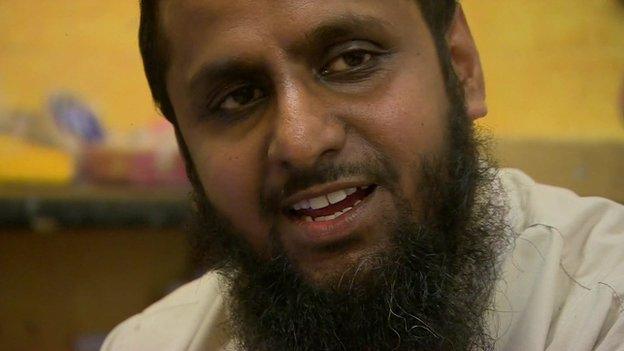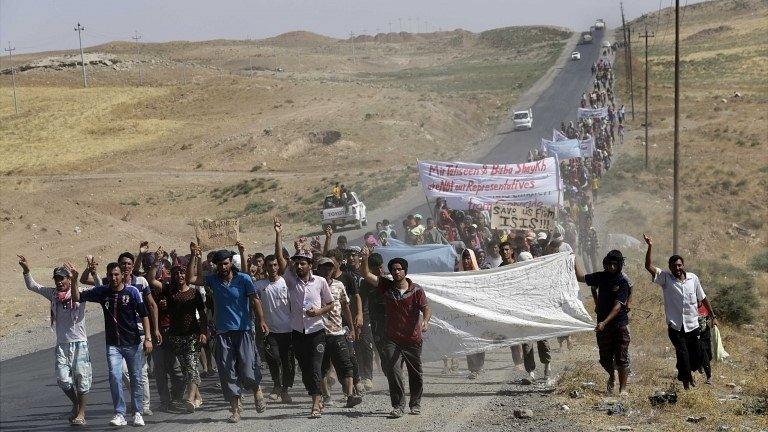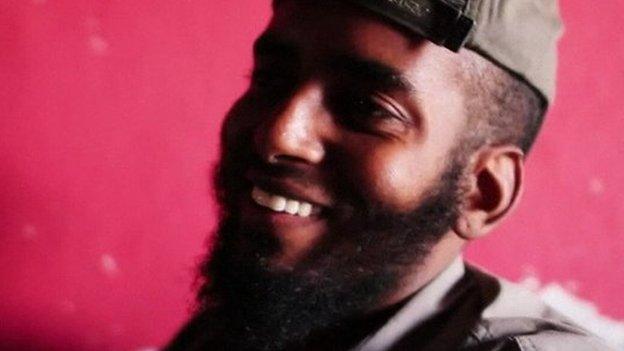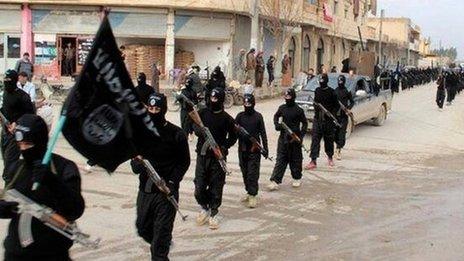British 'jihadist' describes his plan to go to Iraq or Syria to fight
- Published
The BBC has spoken to one British Muslim who says he is willing to join Islamic State fighters, believing it is his religious duty
The role of a reported 400 British jihadists who have joined fighting in Syria and Iraq has been much highlighted in reports from the region in recent weeks.
But what is the motivation for people, usually revealed to be youngsters with little or no experience of conflict, to leave their homes in British towns and cities to do so?
One British man who is still in the UK has told the BBC in an interview that he feels it is his "obligation" to now go to Iraq or Syria.
We don't know his real name, or where he comes from in the UK, and during our TV interview his face is covered with a bright red scarf.
After he says hello, "Ahmed", as he wants to be known, speaks with purpose. He details why he wants to fight in Iraq or Syria.
"God has commanded for the Muslims to go and fight jihad", he says.
It follows a call from the extremist group ISIS, now calling itself Islamic State (IS), for Muslims to leave their homes and join it in its often brutal battle.
For Ahmed it is a religious call he cannot ignore: "This thing takes takes precedence over everything else in my life at the moment, this is the biggest thing for a Muslim.
"To die as a martyr is the promise of paradise, the highest paradise."
He only agreed to speak to us if he could cover his face and if we changed his voice. He never removed his scarf, we never caught even a glimpse of what he looked like.
"God has commanded for the Muslims to go and fight jihad", he said. I asked why: he had a choice, he didn't need to go, so why did he?
Ahmed paused before replying "I have a choice, yes but Islamically this is an obligation."

Islamic State fighters have seized large parts of northern Iraq
What about his family that he would soon leave behind? He said: "Obviously they're upset, some of them are upset but they'll come around."
But why are so many other young Muslims choosing to leave their family, friends and homes to fight in Iraq and Syria? Many observers believe answers can be found on the internet, with extremist propaganda and messages of jihad being sent around the world.
'Religious obligation'
In a small room in north west London that he calls his "centre", watching a video of a jihadist from Kosovo, we find Abu Saalihah.
He describes himself as a student of Sheik Omar Bakri - a radical Islamist preacher banned from the UK.
He openly supports IS and its online messages sent around the world.
The video he shows us has a jihadist burning his passport and waving a small sword.
Again and again, the man calls on other Muslims to join him in Iraq and Syria.
As the clip finishes, Abu Saalihah says: "That is the message coming out, it's your religious obligation."
I ask him if it's this that's radicalising young British Muslims?
He replies: "If you mean radicalised by them supporting ISIS, yeah without a doubt, I think you'll find a lot of youth in the UK supporting ISIS and are willing to go abroad."
The government says more than 400 people have left Britain to fight jihad and 60 people have been arrested for being involved in jihadist activities.
In Iraq and Syria, there is sectarian fighting. IS is accused of brutality, spreading terror against those who stand in its way.
'Hijacking'
I point out to Abu Saalihah that if young British Muslims join extremist groups like IS they risk losing their lives in the conflict.
"The thing is that is what they are seeking," he replies, "They are all seeking to die for the cause of God. For them it is a case of martyrdom of victory."
I ask Abu Saalihah if he realises how disturbing that is for many people. He replies "It will disturb you if you are not from this camp. If you are from that camp, or that viewpoint, it is going to encourage you, motivate you."
But there is a different voice. Inside the Paigham e Islam Mosque in Birmingham, Muhammad Sajjad, the imam, tells young people there is no jihad, there is only sectarian fighting. He is one of hundreds of imams to speak out against jihad.
Listening to his words are Zulficar Khatab and Ahsan Ahmed, two young British Muslims. They believe it is wrong to travel to Iraq and Syria to fight. They also believe they speak for the majority.
"It really hurts my feelings as a Muslim to see these people doing that and thinking its justifiable when it's totally not justifiable at all in any way shape or form," Zulficar says.

Abu Saalihah supports a banned Islamic preacher
Ahsan agrees: "I don't think any religion would be proud if there's radical people like that hijacking the name of their religion."
Theirs though is a viewpoint lost on Ahmed. He believes he is answering a religious call. I asked if he had listened to the British imams, the ones who said it was wrong to go to Iraq and Syria.
"No", he says, "'cause these imams, they are not showing the Islamic viewpoint, they are just government scholars, they are just saying what the government wants them to say."
The government says that one of the real dangers of so many young people going to fight in Syria and Iraq is that, if they return, they represent a serious threat to the security of the UK.
Ahmed tells us he has no intention of ever coming back.
"No not at all, people in this country perceive jihad as people coming back here and bombing train stations and airports and killing innocent people. When I go I will never come back to this country again."
We don't know when he will leave or where he'll go but we do know security services are watching British jihadis - to make sure they don't bring their fight home.
- Published14 August 2014

- Published14 August 2014

- Published11 August 2014

- Published7 August 2014

- Published20 June 2014

- Published23 June 2014

- Published22 June 2014

- Published9 August 2014
